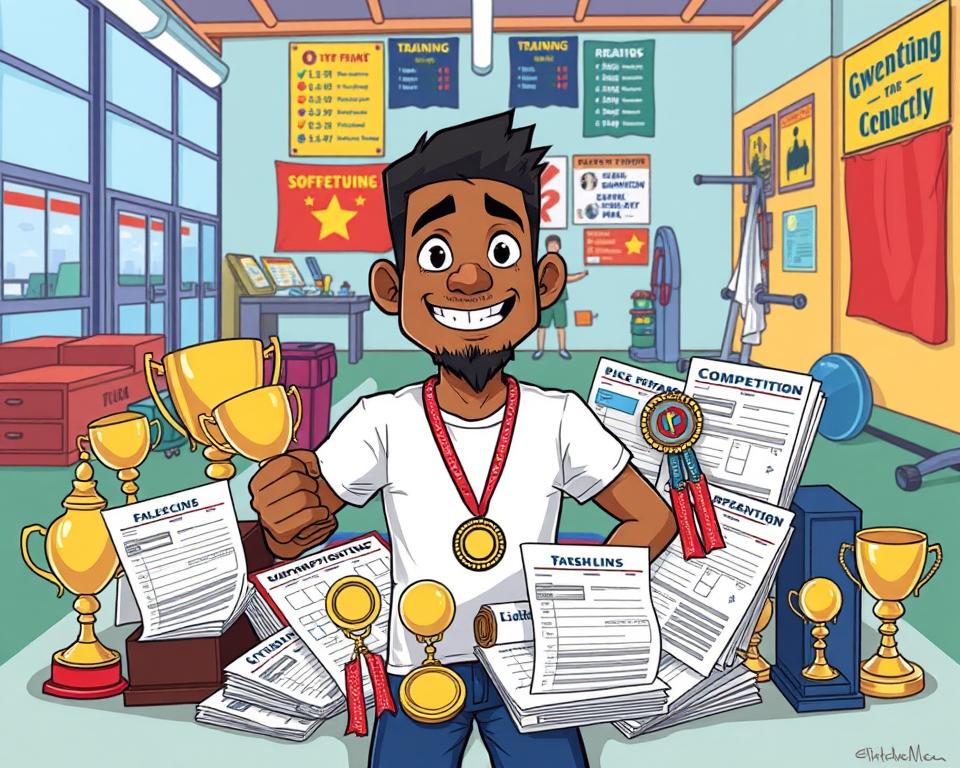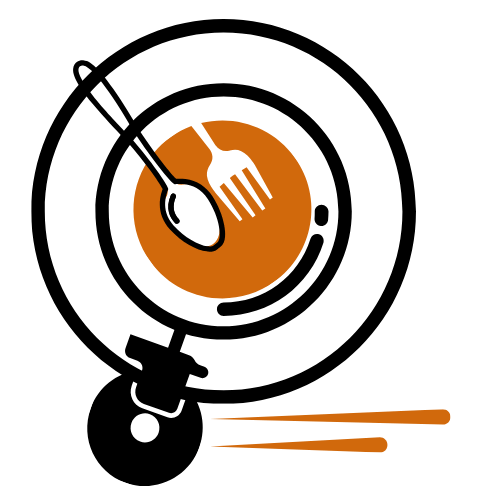bodybuilding & Fitness
Competition Prep: Your Guide to Peak Performance
Competing at your best is no easy feat. It takes dedication, discipline, and a solid game plan. This guide will give you the essential strategies for peak performance. We’ll cover setting goals, nutrition, and mental prep to help you reach your full potential.
As you start your journey to competition glory, remember it’s all about consistent effort and improvement. With the right mindset and techniques, you’ll unlock your true competitive edge. Let’s dive into the secrets of competition prep and peak performance.
Understanding Competition Prep
Getting ready for a big event, like a bodybuilding contest, takes careful planning. This is called competition prep. It’s key to doing your best and reaching your goals.
What is Competition Prep?
Competition prep means getting ready through training, eating right, and getting your mind ready. It’s a complete approach to get you in top shape. This way, you can show off your skills when it counts.
Importance of Preparation in Competing
Why is bodybuilding contest preparation so important?
- It lets you fine-tune your skills, diet, and mindset.
- It helps you handle the physical and mental challenges of the event.
- It boosts your confidence, knowing you’ve prepared well.
- It raises your chances of winning or setting a new personal record.
Knowing the value of competition prep and having a solid plan can boost your success. It makes your competitive journey more rewarding.
“The key to success in any competition is preparation. The more prepared you are, the better your chances of achieving your goals.”
Setting Your Competition Goals
Setting goals is key to success in competitions. You need both short-term and long-term goals. These goals will guide your training and keep you motivated.
Short-term vs. Long-term Goals
Short-term goals are your immediate targets. They might be to improve your technique, increase strength, or qualify for a regional competition. These goals should be clear, measurable, and reachable in a short time, like weeks to months.
Long-term goals are your big dreams. They could be winning a national championship or setting a personal record. These goals take longer to achieve, but they drive your preparation.
How to Measure Success
- Set key performance indicators (KPIs) that you can track and measure, like times, distances, or scores.
- Keep a training journal to record your progress and see how you’re doing against your goals.
- Celebrate your small wins. They boost your confidence and help you move closer to your competition goals.
“The only way to achieve the impossible is to believe it is possible.” – Charles Kingsleigh
By setting clear goals and tracking your progress, you’ll reach your peak performance potential.
Creating a Structured Training Plan
Making a detailed training plan is crucial for reaching your best performance. It helps you stay focused on your goals, whether they’re for the short or long term.
Components of a Training Regimen
A good training plan should cover all bases. It includes:
- Strength training to build muscular power and endurance
- Cardiovascular exercises to improve overall fitness and stamina
- Sport-specific drills and techniques to hone your skills
- Flexibility and mobility exercises to enhance range of motion
Importance of Rest Days
Rest is just as vital as training. It lets your body and mind recover. This helps prevent burnout and aids in muscle repair, boosting your training plan and peak performance.
Modifying Workouts for Different Competitions
Adjust your training for each competition. Change the intensity, duration, or focus of your workouts. This ensures you’re ready and perform at your best. By customizing your training plan for each event, you’ll have a better chance of success and reaching new heights of peak performance.
“Consistency is the key to success in any training plan. By sticking to a structured routine and making gradual improvements, you’ll be well on your way to reaching your competitive goals.”
Nutrition Strategies for Optimal Performance
Good nutrition is key for athletes aiming to reach their best. As you get ready for your contest, focus on planning your diet, staying hydrated, and using supplements wisely. Let’s explore the main nutrition strategies that will help you succeed.
Pre-Competition Meal Planning
The meals you eat before your competition matter a lot. They affect your energy, muscle recovery, and how well you perform. A smart contest diet and carb loading plan can top up your energy stores and get you ready for your event.
- Choose whole foods that give you lasting energy and help muscles recover.
- Start eating more carbs in the peak week strategy to boost your glycogen levels.
- Try different meal times and sizes to see what works best for you.
The Role of Hydration
Staying hydrated is vital for athletes. Not drinking enough can lower your energy, affect your mind, and reduce your physical skills. Create a hydration plan to stay well-hydrated before and during your competition.
- Drink more water before your event.
- Use drinks with electrolytes to replace lost minerals from sweat.
- Check your urine color and how often you pee to see if you’re drinking enough.
Supplements: What You Need to Know
Even with a balanced diet, supplements can give you an extra boost. It’s important to research and talk to a professional to find the right supplements for you.
“Proper nutrition is the cornerstone of peak performance. By prioritizing strategic diet planning, hydration, and supplementation, you can unlock your full potential on competition day.”
Mental Preparation Techniques
As an athlete, your mental game is as important as your physical training. Good mental preparation helps you stay focused, confident, and resilient. These traits are key to doing well in competitions.
Visualization Exercises
Visualization is a strong mental tool. It helps you imagine yourself winning. Start by seeing yourself going through your pre-competition routine. Then, picture yourself performing your skills with calm confidence.
Imagine the sights, sounds, and feelings of your success in great detail. This mental rehearsal prepares your mind and body for the real event.
Developing a Pre-Competition Routine
Having a set routine before competitions helps you stay focused and calm. Your routine might include relaxation, positive affirmations, and physical and mental warm-ups. Try different things to find what works for you.
Then, stick to it every time you compete. This consistency is key to your success.
“The key to success in any competition is not just physical preparation, but also mental readiness. By honing your mental skills, you’ll be able to perform at your peak and achieve your goals.”
Remember, improving your mental preparation takes time but is worth it. These techniques should be a big part of your prep for competitions.
Choosing the Right Competitions
Starting your competition prep journey means picking the right events. It’s key for your success, whether you’re new or experienced. Knowing your skill level and choosing the right competitions can greatly impact your performance.
Assessing Your Skill Level
First, evaluate your current skill level honestly. Look at your training, past competitions, and feedback from coaches. This helps you decide if you’re ready for national events or if local contests are better for you.
Local vs. National Competitions
After assessing your skill, choose between local and national competitions. Local contests are great for beginners. They offer a supportive environment and help you learn the competition process.
National competitions are more challenging but offer more exposure. They require more preparation but can be rewarding if you’re ready.
Choose based on your goals, experience, and readiness. The right competition can boost your bodybuilding journey and help you reach your goals.

“The key to success in competition prep is to choose events that align with your skill level and goals, allowing you to showcase your progress and unlock new levels of performance.”
Building a Support Team
Reaching peak performance in competition prep is not just about individual effort. A strong support team can be the game-changer. With the right people around you, motivation soars, and you get valuable insights and guidance.
Finding a Coach or Mentor
Finding a coach or mentor is a key step in building your support team. They offer personalized expertise and support. A good coach helps you create a training plan, gives feedback, and pushes you to excel.
Look for someone with a track record of helping athletes achieve peak performance.
Importance of a Supportive Community
Having a supportive community is also crucial. Connecting with others, joining forums, or finding a local group offers camaraderie and encouragement. These connections keep you motivated, share best practices, and help through tough times.
“The best athletes in the world don’t get there alone. They have a support team that helps them reach their full potential.”
Remember, competition prep is a team effort. A strong support team boosts your chances of success and makes the journey enjoyable.
Tracking Your Progress
To get ready for competitions, it’s key to watch your progress closely. Journaling and using performance apps help you stay on track. They let you adjust your training and prep plans as needed.
Using Journals and Apps
Writing down your workouts and progress in a journal can change your game. It helps you see your strengths and weaknesses. Plus, apps track your heart rate, sleep, and recovery, giving you a full picture of your health.
Analyzing Performance Data
Looking at your data regularly helps you make smart choices for competition prep. Find trends and focus on areas that need work. This way, you can fine-tune your training and nutrition for peak performance.
Tracking and analyzing your progress is crucial for success in competition prep. Use these tools to get the most out of your prep and set yourself up for victory.
“The only way to do great work is to love what you do. If you haven’t found it yet, keep looking. Don’t settle.” – Steve Jobs
Common Challenges in Competition Prep
Starting your competition prep journey is exciting but also comes with challenges. You’ll face obstacles that test your determination. We’ll look at two big hurdles: overcoming self-doubt and managing your time well.
Overcoming Self-Doubt
Self-doubt can be a big challenge in your prep. It’s normal to doubt your skills or fear not meeting your goals. But, it’s important to learn to silence that inner critic.
Try visualization exercises to boost your confidence. Celebrate every small win. Surround yourself with people who believe in you.
Time Management Strategies

Managing your time between training, work, and personal life is tough. Good time management is crucial to avoid feeling overwhelmed. Create a schedule, prioritize tasks, and say no to things you don’t need to do.
Use tools and apps to stay organized. Don’t hesitate to delegate or outsource tasks when you can.
“Successful competition prep requires a combination of physical preparation and mental resilience. By addressing common challenges head-on, you’ll be well on your way to achieving your peak performance goals.”
The Day Before the Competition
As the competition day gets closer, it’s key to focus on your final preparations. Make sure you’re in top shape. The day before is crucial to fine-tune your peak week strategy and adjust your nutrition and recovery.
Final Preparations to Consider
In the final 24 hours before the competition, consider these key steps:
- Do a light, active recovery workout to keep your muscles active without getting too tired.
- Adjust your sodium manipulation strategy to manage water retention and look your best on stage.
- Finalize your pre-competition meal plan with nutrient-dense foods to fuel your performance.
- Double-check your competition day checklist to make sure you have everything you need.
Importance of Rest and Relaxation
It’s tempting to try to do more in the final hours, but rest is key. Your body needs time to recover and get ready for the event. Do some light stretching, foam rolling, or gentle yoga to help with recovery and clear your mind.
“The final 24 hours before a competition are critical. It’s not the time to experiment or push your body to the brink. Focus on rest, recovery, and fine-tuning your peak week strategy to ensure you’re at your best on competition day.”
By sticking to a well-planned peak week strategy and focusing on rest, you’ll be ready to perform your best on the competition stage.
During the Competition
When the big day comes, having a solid plan is key. Good warm-up routines and staying calm under pressure are crucial. They help show off your physique presentation and posing practice.
Warm-Up Techniques
Starting with a good warm-up is vital. Begin with dynamic stretches to get your blood flowing and joints moving. Make sure to work on the muscles you’ll use in your routine.
Do exercises like arm circles, leg swings, and squats. As you go, increase the intensity. This gets your heart rate up and muscles ready.
Staying Focused Under Pressure
- Use visualization to practice your routine in your mind. Picture yourself doing each move with skill and confidence.
- Try deep breathing to calm your nerves and stay focused.
- Have a pre-competition routine to get you ready. This could be listening to music or meditating.
- Keep your mind on the task at hand. Don’t worry about the outcome or things you can’t control.
By learning these tips, you’ll be ready for the excitement. You’ll perform your best when it counts.
“Success is not final, failure is not fatal: it is the courage to continue that counts.” – Winston Churchill
Post-Competition Reflection
The journey doesn’t end when the competition is over. This is the perfect time to reflect on your performance. Use those insights to propel you forward. By analyzing your strengths, weaknesses, and lessons learned, you can improve continuously. You can also set sights on even greater achievements in future events.
Analyzing Performance
Take the time to review your competition experience objectively. Think about what went well and where you faced challenges. Consider your preparation, execution, and the outcome. Seek feedback from your coach, teammates, or mentors for a well-rounded perspective.
This honest self-assessment will help you identify areas for growth. It will also show you how to optimize your approach for the next competition.
Setting New Goals for Future Events
With a clearer understanding of your performance, you can set new, meaningful goals. These might include improving a specific skill or increasing your mental resilience. Or, you might aim for a higher placement in an upcoming event.
Remember to establish both short-term and long-term objectives. This ensures you have a clear roadmap for your continued development. Stay focused, stay motivated, and get ready to elevate your game to new heights.

